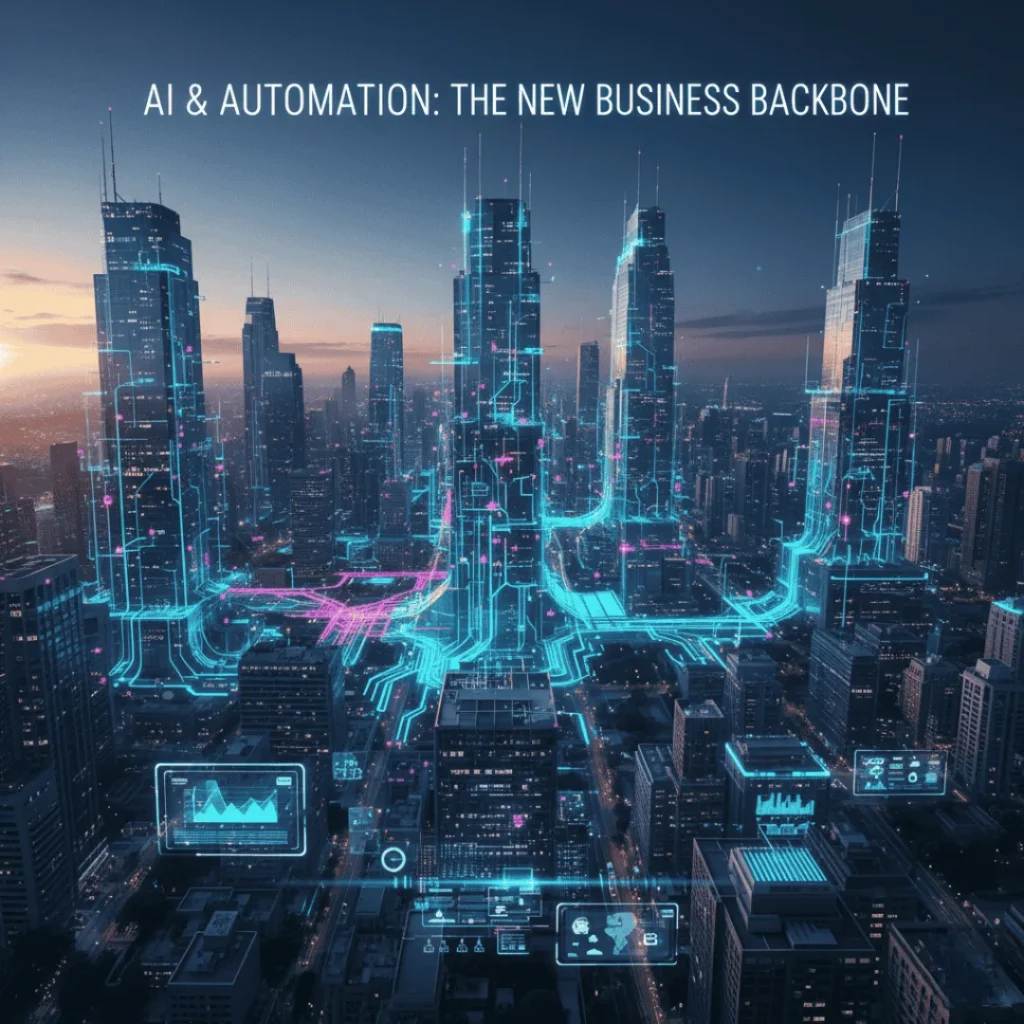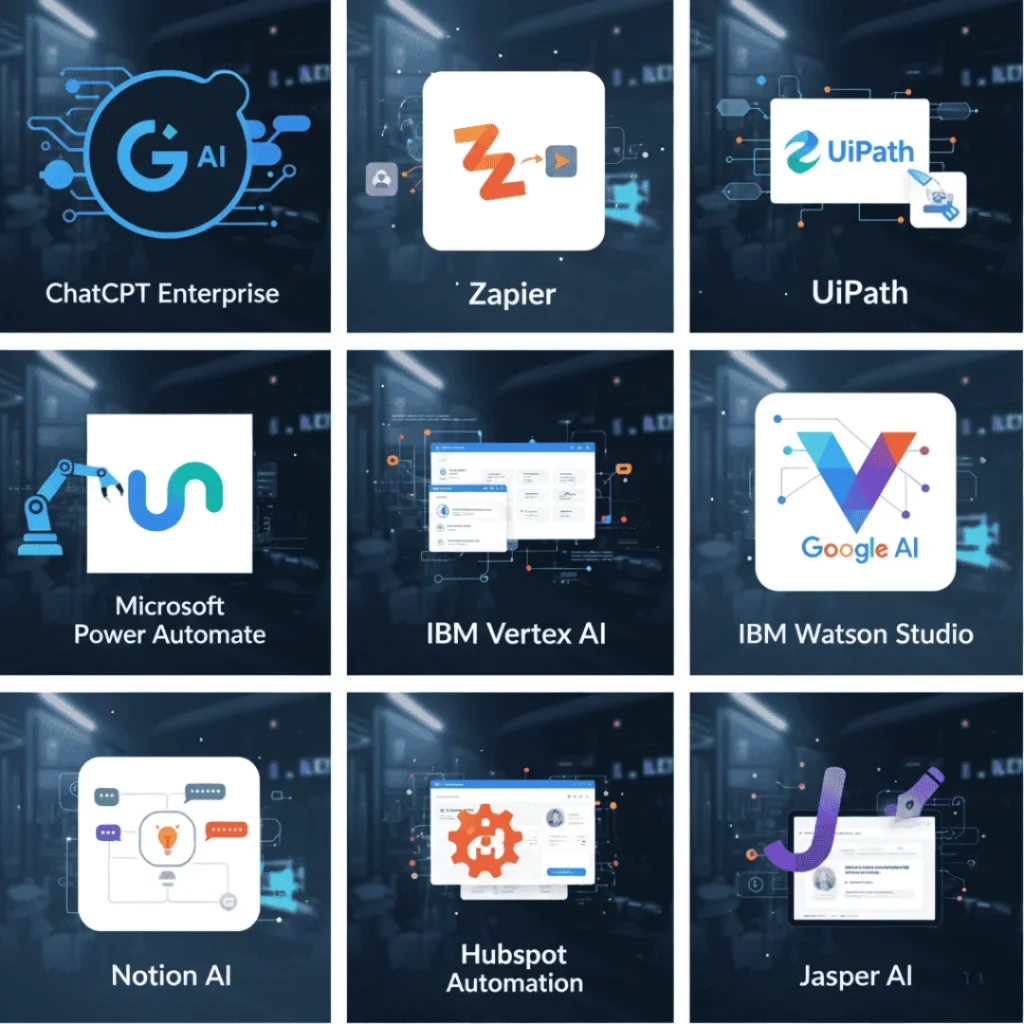In 2025, AI tools and automation tools are no longer optional—they are critical for businesses aiming to stay competitive. From streamlining marketing campaigns to optimizing operations, companies are leveraging AI in business to work smarter, faster, and more efficiently.
AI-powered solutions have moved beyond buzzwords—they are the foundation of modern business automation. Organizations integrating AI tools and workflow automation are experiencing higher productivity, lower costs, and smarter, data-driven decision-making. The message for today’s businesses is clear: embrace AI-driven automation or risk falling behind.

Understanding AI Tools and Automation Platforms
Artificial Intelligence (AI tools) simulate human intelligence by analyzing data, recognizing patterns, and making predictions. They enable businesses to make faster, smarter decisions.
Automation tools handle repetitive tasks such as data entry, reporting, or scheduling, freeing employees to focus on strategy, creativity, and innovation.
Combined, AI in business and automation platforms create an intelligent ecosystem that increases accuracy, saves time, and scales across all departments.
Why AI and Automation Tools Are Vital for Business Growth
Manual processes can slow productivity, increase errors, and raise costs. AI-powered business automation solves these challenges by enabling:
1. AI-Powered Efficiency
Tasks like email management, scheduling, and reporting can be automated, allowing employees to focus on high-value work.

2. AI-Driven Data Insights
AI analytics tools like Google Vertex AI and IBM Watson Studio process large volumes of data, helping leaders make smarter business decisions quickly.
3. AI Tools for Cost Savings
Intelligent automation reduces manual labor and human errors, directly impacting profitability.
4. Enhancing Customer Experience with AI
AI chatbots, virtual assistants, and personalization engines enable 24/7 engagement, improving customer satisfaction and loyalty.
5. Scalable AI Solutions
Cloud-based AI platforms grow with your business without the need for additional infrastructure or hiring.
Top AI Tools Transforming Businesses in 2025
Some of the leading AI tools and automation platforms include:

- ChatGPT Enterprise – Streamlines content creation, customer support, and workflow automation.
- Zapier – Automates repetitive tasks by connecting thousands of apps.
- UiPath – Robotic Process Automation (RPA) for HR onboarding, invoice processing, and other rule-based tasks.
- Microsoft Power Automate – Integrates workflows, databases, and APIs in the Microsoft ecosystem.
- Google Vertex AI – Enables developers to build, train, and deploy machine-learning models.
- IBM Watson Studio – Enterprise-grade AI for automation, predictive analytics, and document processing.
- Notion AI – Helps teams brainstorm, summarize, and organize content efficiently.
- HubSpot Automation – Uses AI analytics to manage lead nurturing, social media, and CRM tasks.
- Jasper AI – Creates content faster, including blogs, emails, and ad copies, maintaining brand consistency.
- Make (formerly Integromat) – Visual workflow automation connecting multiple apps for complex projects.
How AI Tools and Automation Platforms Transform Business Functions
AI and automation impact every business area:
Marketing Powered by AI
Predictive analytics, automated ad optimization, and personalized campaigns improve ROI.
Sales and AI-Driven Forecasting
Lead scoring, AI forecasting, and CRM automation streamline sales operations.
AI in Operations and Workflow Optimization
Inventory management, reporting, and workflow automation reduce errors and boost efficiency.
HR Transformation with AI Tools
Resume screening, onboarding, and employee engagement analytics are handled faster and more accurately.
Finance Automation with AI
Fraud detection, invoicing, and budgeting become more precise and less time-consuming.
By connecting AI tools across departments, companies can unify operations, streamline workflows, and increase overall performance.

Integrating AI into Corporate Strategy
To fully leverage AI in business, organizations should:
Assess AI Needs for Your Business
Identify repetitive, data-heavy tasks suitable for automation tools.
Choose Scalable AI Tools
Cloud-based AI platforms allow flexibility and growth without major infrastructure changes.
Train Teams for AI Success
Technology is effective only when employees understand and use it efficiently.
Monitor AI Performance and ROI
Track improvements in productivity, cost savings, and return on investment.
With a strategic approach, businesses often see measurable benefits within months.
Challenges When Implementing AI Tools
While AI-powered solutions provide huge advantages, businesses must consider:
Data Privacy in AI Applications
Compliance with GDPR and other regulations is critical.
Closing AI Skill Gaps
Teams must be trained to manage AI tools effectively.
Integrating AI with Legacy Systems
Older software may need upgrades or replacements for full automation.
Choosing reliable vendors and robust cloud infrastructure can reduce these risks significantly.
The Future of AI and Automation in Business

The future of AI in business includes:
- Autonomous decision-making systems
- AI-powered project management
- Hyper-personalized marketing experiences
- Advanced predictive analytics for faster decisions
Companies adopting AI tools today are preparing for long-term growth, innovation, and business agility.
Final Thoughts on AI-Driven Business Success
AI Tools and automation platforms are transforming modern business. From AI analytics to cloud-based workflow automation, organisations embracing these technologies are redefining how they operate, compete, and grow.

